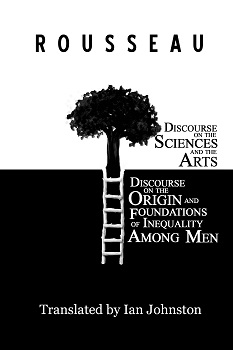Questions? Call us
toll free:
1-800-856-3060
Discourse on the Sciences and the Arts and
Discourse on the Origin and Foundations of Inequality
Among Men by Jean Jacques Rousseau
Translated by Ian Johnston
Jean Jacques Rousseauís provocative
Discourse on the Sciences and the Arts (1750)
launched a vigorous assault on the most cherished beliefs of his age in
a passionate indictment of civilized ďprogress,Ē which, in Rousseauís
eyes, has led to a debilitating corruption of human nature and morality.
Four years later, Rousseau produced another such assault in the
Discourse on the Origins and
Foundations of Inequality Among Men. A landmark of
political thought, this work argues that human beings are by nature
free, happy, and independent, but that social institutions and human
inventions have corrupted that condition and brought about all human
misery.
Many of the details of Rousseauís account are open to dispute, but the
revolutionary impact of the argument is beyond doubt: by insisting that
our understanding of modern society must be placed on a historical
footing, Rousseau invites us to see social injustice and evil as
products of pernicious social institutionsónot permanent features of an
unsatisfactory or fallen condition. He offers no clear solution to the
evils he diagnoses, but the implication of his argument is clear:
societyís most serious problems are caused, not by human nature, but by
social institutions, especially property; if we wish to address these
problems, we must change those institutions. The unflagging passion,
clarity, and rhetorical power of Rousseauís style have inspired many
social reformers and revolutionaries. Even today, his words are still
cited by those who wish to challenge just how free and happy our
citizens are in a society that prides itself on economic and personal
freedom and the pursuit of happiness.
Classics/ Philosophy ISBN:
978-1-935238-41-6
USD $9.95
At Richer Resources, we are dedicated to the creation of high quality books, art and other media intended to enrich the lives of individuals of all ages.
As an independent publisher, we are bound by a sense of integrity and quality to produce products which enhance the lives and vision of individuals everywhere.
Sign up to receive notice of free eBooks, new releases and special subscriber-only offers.
(You can unsubscribe at any time)
